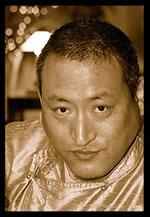|
|
“A Performance of Songs from the Tibetan Epic King Gesar”
Younge Khachab Rinpoche
Translated by Ngawang Legshe
November 2, 4:00 pm
Memorial Union N208
In early November Younge Khachab Rinpoche (pronounced rin-po-shey) will perform songs from the Tibetan epic King Gesar. Rinpoche learned traditional Gesar songs from his father, who incorporated them into his daily Buddhist practices. No "complete" version of King Gesar has ever been recorded. The epic’s many incarnations span the Tibetan and Mongolian languages, Buddhist and nonBuddhist paradigms, verse and prose, and oral and written forms of composition. Read more...
Rinpoche (the honorific title by which Younge Khachab Rinpoche is known) is an esteemed scholar, poet, and spiritual leader in the Tibetan Buddhist tradition. He received his Geshe degree (similar to a Ph.D.) from Ganden Jangtse University in South India in 1989. In addition to completing a three-year retreat—the prerequisite to becoming a Lama (spiritual teacher)—he taught at Nyen Chig Ling Monastery under the scholar’s title “Kenpo.” Following the behest of his father, also a preeminent Lama, Rinpoche moved to the United States, where he is in the process of establishing a college for the study of Buddhist texts (“Shedra”). He frequently lectures and leads retreats at meditation centers internationally. For more information, visit his website: http://www.rimeshedrubling.org.
For more information on the epic of King Gesar, see“Singers and Storytellers in the Gesar/Geser Epic Performance Tradition: A Brief Introduction”
http://www.cass.net.cn/chinese/s16_sws/English/epics/SingersandStorytellers.htm
A Select Bibliography:
Alexandra David-Neel and Lama Yongden. 1933. The Superhuman Life of Gesar of Ling. Translated from the French in collaboration with Violet Sydney. London: Rider. Rev. ed. 1959.
Robin Kornman. 1999. Gesar Epic. New York: Harper Collins.
R. A. Stein. 1956. L'épopée tibétaine de Gesar dans sa version lamaïque de Ling. Paris: Presses Universitaires de France.
Yang Enhong. 1998. “A Comparative Study of the Singing Styles of Mongolian and Tibetan Geser/Gesar Artists.” Oral Tradition, 13: 422-34.
——. 2001. “On the Study of the Narrative Structure of Tibetan Epic: A Record of King Gesar.” Oral Tradition, 16: 294-316.
Zhambei Gyaltsho. 2001. “Bab Sgrung: Tibetan Epic Singers.” Oral Tradition, 16: 280-93.
http://www.oraltradition.org/news/rinpoche.php |
-

|